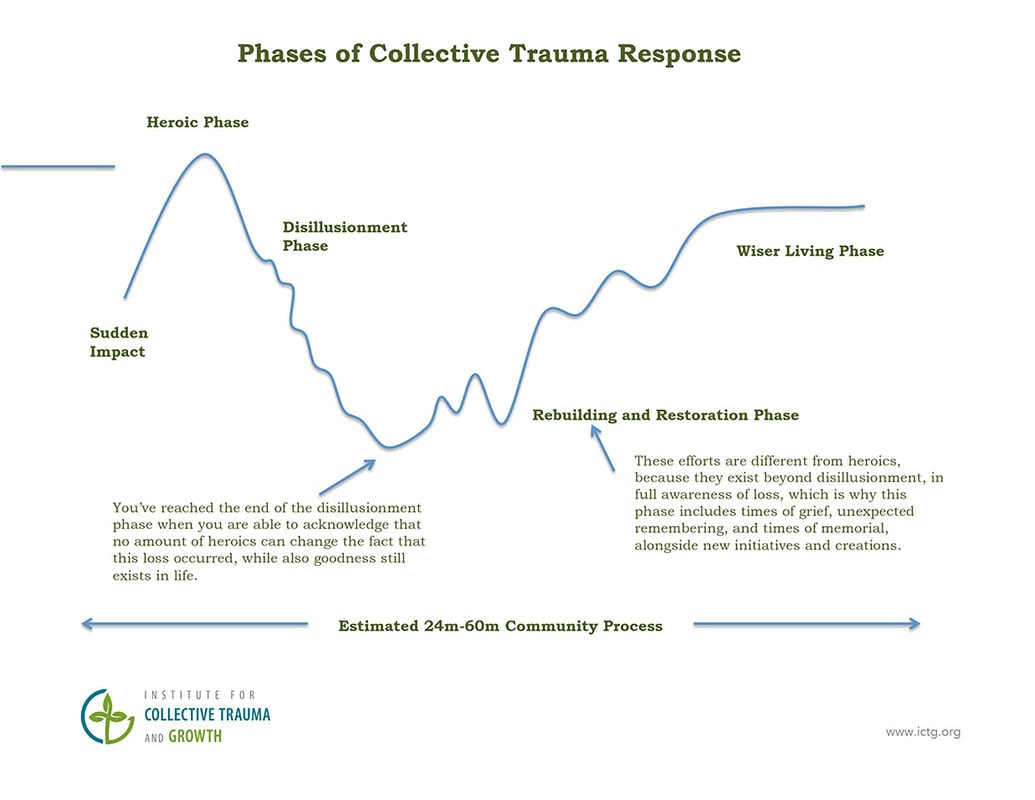|
This post, written by Rev. Dr. Kate Wiebe, originally was published June 17, 2019, on the ICTG blog. Almost two years ago now, board director emeritus and former clinical psychologist, Rev. Dr. Gordon Hess, PhD, wrote on this blog. It's about how ICTG started out five years ahead of the curve on topics of trauma, groups, and communities. It may be hard to believe, especially these days when it can seem like nearly everyone is talking about trauma, PTSD, brain science, fight/flight reactions, and long-term impacts of adversity, but back when ICTG was starting in 2012 it felt like hardly anyone was talking about these critical issues. We reviewed the original ACEs study and considered how those statistics may be reflected in schools, congregations, and businesses. Then we compared that with the types of disasters that had occurred around the country during the early 2000s. We saw an immense need to inform organizational leaders and provide coaching and therapeutic services for them. Our tremendous donors, volunteers, and staff have been doing that ever since. Though we're immensely grateful to see more resources becoming available to organizational leaders, we see that many resources, like the Phases of Disaster Response, and the current categories for disaster funding (which segment according to the type of incident that has occurred, such as a tornado or a wildfire or an act of terror), do not fit the mold of challenges communities are facing today. This great disparity further complicates, frustrates, and hinders the healing and restoration processes for survivors. We can do so much better. Of course, our country has always had communities facing compounding traumatic stress, particularly in cases where neighborhoods experienced oppression, hatred, poverty, addictions, and violence on an ongoing basis. Thankfully, organizations like the Equal Justice Initiative that is helping the country come to terms and make amends to great wrongs we have caused or perpetuated, and Fearless Dialogues that is helping people recognize our mutual humanity and work for change. Now, the same communities that have experienced decades of heartache and destruction, as well as communities that have experienced far more privileged circumstances, all are facing additional cascading tragedies. These include multiple natural disasters within close proximity, or combinations of natural and human-caused disasters, or combinations of natural and technological disasters, or disasters in communities amid overwhelming rates of opioid addictions and suicide. We must all do our part to consider the ways we can sustain ourselves and our neighbors amid impacts of trauma and disaster, add good back into a troubled world each day, and share strength and nourishment we have to offer to others as we go. Beyond our blogs, some of the ways that donors, volunteers, and staff at ICTG are making a difference is by providing a range of support for leaders. Leaders often need and want:
Please do not hesitate to reach out if you think any of these resources may be helpful to you. If you would like to encourage this critical work, I invite you to make a financial contribution today. Your generosity makes a great difference! Thank you.
0 Comments
Leave a Reply. |
�
COMMUNITY BLOGFrom 2012-2021, this blog space explored expanding understanding and best practices for leadership and whole-community care.
This website serves as a historical mark of work the Institute conducted prior to 2022. This website is no longer updated. Archives
January 2021
Categories
All
|



 RSS Feed
RSS Feed
